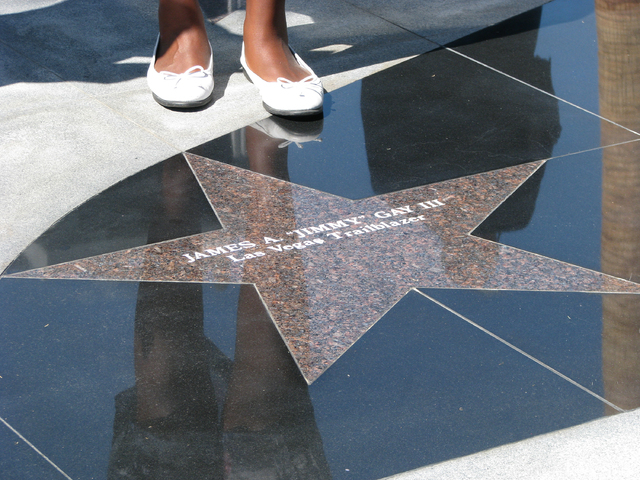Star honoring Las Vegas civil rights leader added to Garden of Dreams

Early Las Vegas civil rights leader James A. “Jimmy” Gay III was honored by having the first star on the Garden of Dreams dedicated in his honor Sept. 25.
The garden at Palm Downtown Mortuary and Cemetery, 1325 N. Main St., is a monument to the civil rights movement and was dedicated last year.
Gay was a community and business leader who helped break color barriers as the first black mortician in Las Vegas and the first black casino executive. He also inspired children in athletics as director of the first recreation center in Las Vegas.
The garden and monument features four columbariums for funerary urns. Each is topped with a word: dignity, equality, freedom and justice. Inscriptions are scheduled to be added each year as other civil rights luminaries are honored. The inscription outlining Gay’s life and achievements are on the dignity columbarium.
“We wanted to find a way to give back to the community,” said Larry Davis, general manager of the Palm Downtown Mortuary and Cemetery. “We wanted the garden to have an educational component which would allow people to visit and learn about civil rights movements in history and how it pertains to Las Vegas and Nevada.”
Friends, family and dignitaries attended the Sept. 25 event for Gay and recalled his life. Las Vegas City Councilman Bob Coffin said he remembered Gay as an energetic and enthusiastic person who was a friend to all.
“You would never consider him anything but a friend,” Coffin said. “He absolutely lit up the room with that wonderful smile.”
Gay’s trademark smile belied his involvement in complicated times.
“I never saw my dad angry,” said his son, Philip Gay, during the ceremony. “I saw him disgusted and disappointed, but I never saw him angry. That’s got to tell you something, that a man could go through the things he went through back then and keep that smile on his face.”
Gay moved to Las Vegas in 1947 for the health of his wife, Hazel, but the college-educated star athlete had trouble finding work, eventually taking a job as a cook. In a few years, he was hired as the first director of the defunct Jefferson Recreation Center in West Las Vegas and then became the first black casino executive in Las Vegas, working as the director of communications at the newly opened Sands. He frequently worked several jobs simultaneously.
Philip Gay recalled that on the opening night at the Sands, when the casino took in more than $1 million, only two people were allowed in the count room. One of them was his father.
Gay worked at the Sands at a time when blacks weren’t allowed in the front doors, and the city was called “the Mississippi of the West.” His winning personality and friendship with the stars, including Nat King Cole and the Rat Pack, opened many doors and helped lead to the historic meeting at the Moulin Rouge, where an agreement was hashed out to desegregate Las Vegas casinos.
Claytee D. White, director of the Oral History Research Center for UNLV Libraries, read from a statement that U.S. Sen. Harry Reid delivered on the floor of the Senate outlining Gay’s many achievements. These included being a member of the NAACP, being active in local politics, serving as a member of the Nevada Democratic Central Committee, the executive board of Culinary Union Local 226, executive at five casinos and being named as a Distinguished Nevadan by the University of Nevada Board of Regents in 1988 and the Man of the Year by the Jaycees in 1952. He also was the local NAACP chapter’s Man of the Year several times.
In addition, he was the first black member of the Nevada Athletic Commission and the first black in the U.S. to be certified as a water safety instructor by the American Red Cross. He held a world record in the 100-yard dash and was an alternate for the 1936 Olympics.
In 1978, the city of Las Vegas named James Gay III Park at Washington Avenue and D Street for him. The park closed last year following two stabbings that occurred four months apart. City officials are looking at options for reopening it, but no date has been set.
Reid concluded in his 1999 speech about Gay by saying: “This U.S. senator is a better man because of the friendship he enjoyed with Jimmy Gay, and Nevada is a better state because of his lifelong influence to ensure equality for all.”
Contact East Valley View reporter F. Andrew Taylor at ataylor@viewnews.com or 702-380-4532.